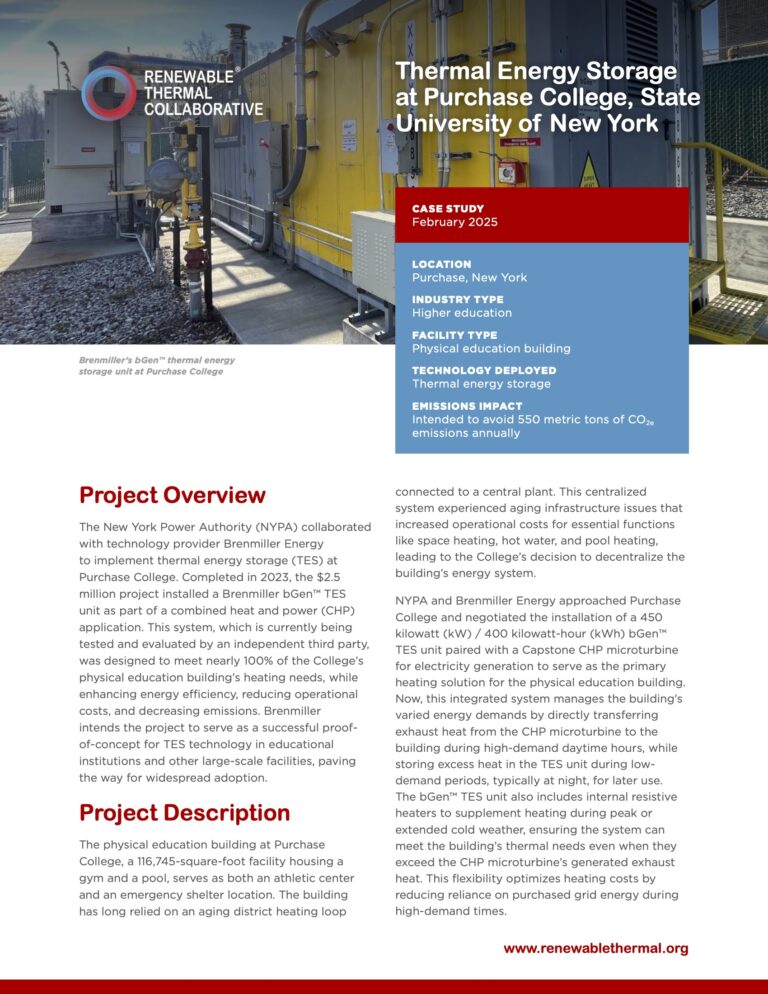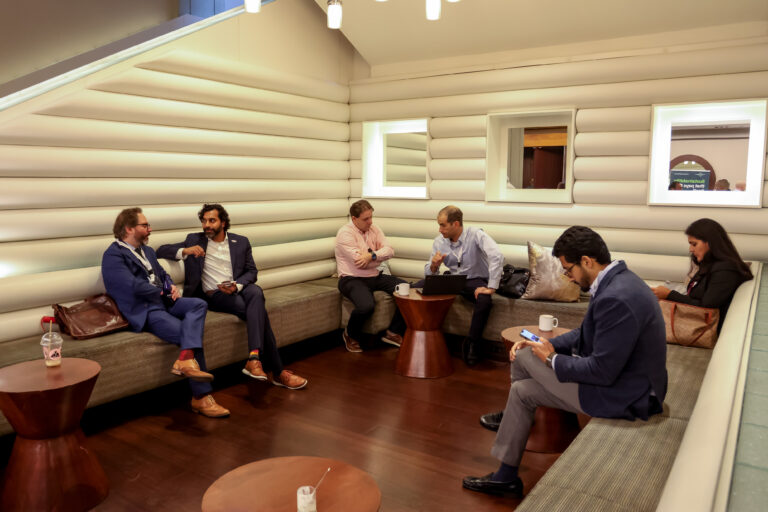For Immediate Release
July 25, 2024 1:00 pm ET
Renewable Thermal Collaborative’s Quarterly Update on Industrial Decarbonization
New Members, New Research, New Projects in Q2 2024
Washington, D.C. – The Renewable Thermal Collaborative (RTC), the only global coalition focused exclusively on the decarbonization of thermal energy with renewable solutions, today shared its Quarterly Update on Industrial Decarbonization (QUID) for the second quarter of 2024. Highlights include: three new Members and five new Solutions Providers joined the Collaborative; the Collaborative released two new research publications and three case studies; the Collaborative conducted six events; and four Collaborative Members and four Collaborative Solutions Providers announced new projects. These highlights represent some, but not all, of the progress being made towards the RTC objective of accelerating the pace of industrial decarbonization to meet climate targets.
“RTC’s continued growth in new Members reflects the increasing attention leading companies are paying to thermal energy decarbonization with renewable solutions,” remarked Perry Hodgkins Jones, RTC Membership Director. “RTC is a place where global industrials and other large thermal energy users can collaborate with peers, share insights, and learn about solutions pathways as they work to implement decarbonization solutions.”
Highlights of the second quarter of 2024 include the following:
1) Three New Members and Five New Solutions Providers
With the addition of the following companies last quarter, the RTC includes 46 Members and 52 Solutions Providers in the United States and around the world. Members include global industrial and institutional energy buyers representing more than $6.3 trillion in market capitalization across a diverse range of industries, including chemical, food and beverage, manufacturing, and pharmaceuticals. Solutions Providers are technology companies, advisors, developers, and others working to accelerate the renewable thermal market.
New Members (https://www.renewablethermal.org/our-members/)
Cisco is a worldwide technology leader whose purpose is to power an inclusive future for all by helping their customers reimagine their applications, power hybrid work, secure their enterprise, transform their infrastructure, and meet their sustainability goals. They are committed to reaching net-zero greenhouse gas (GHG) emissions across their value chain by 2040.
Nestlé USA is part of Nestlé S.A., the world’s largest food and beverage company headquartered in Vevey, Switzerland. Nestlé USA’s food and beverage portfolio includes many household brands including Coffee-Mate, DiGiorno, and Nestlé Toll House. They are committed to achieving net zero GHG emissions by 2050.
Savencia is an international, independent family food group, with 25,000 employees worldwide and brands sold in 120 countries. The Group has two entities: Savencia Fromage & Dairy and Savencia Gourmet. They are committed to reducing, per ton produced, greenhouse gas emissions from production and transport by 20% by 2025 (versus 2015), increasing use of renewable energies, and reducing the carbon footprint of the volume of milk sourced by 300,000 tons of CO2 eq by 2025 (versus 2010).
New Solutions Providers (https://www.renewablethermal.org/our-solutions-providers/)
Airthium provides reliable, low-cost, efficient, and clean industrial heat supply up to 550°C/1022°F with the help of a first-of-a-kind, very high temperature heat pump. Their heat-pump powered boilers and dryers are especially suited to the food, paper, automotive, and mining industries.
Elstor provides zero-carbon Electrified Thermal Energy Storage for industrial steam and heat production. They provide scalable solutions of 5-100MWh of high- temperature heat storage (up to 500C/932F) delivered on demand as steam or heat.
Magaldi Power SpA designs and manufactures tailored bulk material handling systems for industrial applications. Their green energy solutions include the Magaldi Green Thermal Energy Storage system and STEM Concentrated Solar Power/Concentrated Solar Thermal system. They are also active in the photovoltaic market.
TES US is a global green energy company that produces e-NG (electric natural gas derived from green hydrogen). Headquartered in Europe, TES is committed to making reliable and affordable green energy accessible to all by implementing giga-scale projects using a proven, scalable, and cost-effective method.
Vilter by Copeland provides industrial compression products and solutions for demanding applications in refrigeration and oil and gas industries. Vilter is developing one of the first purpose-built CO2 refrigeration solutions.
2) Eleven New Publications and Events
The Collaborative released two new research publications and three case studies, and convened six events in the second quarter of 2024:
Publications (https://www.renewablethermal.org/category/publications/)
Case Study: Decarbonizing Process Heat at California Dairies, Inc. with Skyven Technologies: This case study details the partnership between California Dairies, Inc. (CDI), the largest member-owned dairy cooperative in California, and RTC Solutions Provider Skyven Technologies to decarbonize industrial process heat across two major CDI facilities. It provides an in-depth look at the project’s integrated approach to deploying solar thermal technology, smart steam traps, and heat recovery systems using an innovative Energy as a Service (EaaS) model.
Case Study: MVR Heat Pumps & Thermal Efficiency at Chivas Brothers Distillery: This case study explores how Chivas Brothers implemented innovative heat pump technology from RTC Solutions Provider Piller Blowers & Compressors at its distillery in Scotland to increase efficiency and reduce emissions. The project uses mechanical vapor recompression (MVR) technology to recover thermal energy from the whisky distillation process, reducing the site’s total energy consumption by 48% and carbon emissions by 53%.
Case Study: Thermal Energy Storage at Herkkumaa Food Manufacturing Facility: This case study details the partnership between Herkkumaa Oy, a Finnish food manufacturer, and RTC Solutions Provider Elstor Oy to deploy a 10 MWh thermal energy storage (TES) system to decarbonize Herkkumaa’s process steam production. Implemented in 2023, this system converts electricity into thermal energy and stores for on-demand use, replacing the burning of light fuel oil. The TES system provides up to 3,000 MWh of steam annually, fully eliminating emissions from process heating and reducing annual energy costs by $140,000.
Chemical Sector Assessment: This report provides a comprehensive analysis of decarbonization opportunities within the U.S. chemical industry, which accounts for approximately 20% of the country’s overall industrial emissions. This report outlines effective strategies to reduce thermal emissions. If implemented, these approaches could deliver over 60% decarbonization of key production processes by 2050.
Solar Thermal Action Plan: This action plan outlines a comprehensive strategy to accelerate the adoption of solar thermal technology for industrial process heating. This plan highlights the significant potential of solar thermal to reduce greenhouse gas emissions and contribute to the RTC’s overall goal of a 30% reduction in U.S. industrial thermal emissions by 2030 and full decarbonization by 2050. It addresses key barriers to adoption, including knowledge and policy gaps, and proposes market, policy, and community actions to overcome these challenges.
Roundtable Discussion: Advancing State Policy Support for Renewable Thermal Decarbonization Pathways: Open to all RTC Members and Solutions Providers, this virtual roundtable discussion featured information on state-level policy opportunities, including research conducted by ENGIE Impact, and open dialogue about which policies can add the most value for large thermal energy users and solutions providers.
LinkedIn Live Fireside Chat: Decarbonizing Process Heat at California Dairies, Inc. with Skyven Technologies: This livestream provided a high-level overview of the RTC’s recent Case Study on Decarbonizing Process Heat at California Dairies, Inc. with Skyven Technologies. Chris Barnhill, Director of Marketing at Skyven, shared how the project started, what it took to bring it to fruition, key outcomes, and lessons learned.
Case Studies in Industrial Process Heat Decarbonization Webinar: This webinar explored two case studies focused on industrial process heat decarbonization with integrated solar thermal and heat recovery solutions. In the first case study, speakers from Colgate-Palmolive and Absolicon Solar Collector AB discussed how a solar thermal installation at Colgate-Palmolive’s home goods manufacturing plant in Athens, Greece meets 70% of the facility’s thermal energy demand, delivers net cost savings, and contributes to the company’s decarbonization goals. In the second case study, Skyven Technologies described how a unique third-party financing structure enabled California Dairies, Inc. to deploy six projects across two of its largest dairy processing facilities, avoiding 7,000 metric tons of CO2 emissions each year.
LinkedIn Live: Chemical Sector Assessment Release Preview: This livestream featured a discussion between Cihang Yuan, Senior Program Officer at World Wildlife Fund, and Caroline Narich, Managing Director & Net Zero Strategy Lead at Accenture, on the context and purpose of the assessment along with the key takeaways.
Case Study Webinar: Electrifying Industrial Process Heat: This webinar explored two case studies focused on decarbonizing process heat in the food and beverage sector with thermal energy storage and industrial heat pumps. In the first case study, speakers from Herkkumaa Oy and Elstor Oy discussed how installing a thermal energy storage system at Herkkumaa’s food manufacturing facility in Finland reduced its annual energy costs by $140,000 and eliminated its process steam emissions. In the second case study, Piller Blowers & Compressors GmbH described how its mechanical vapor recompression (MVR) heat pump technology enabled Chivas Brothers, the Scotch whisky business of Pernod Ricard, to recover waste heat and electrify distillation at Glentauchers, reducing its carbon emissions by 53%.
Chemical Sector Assessment Webinar: This in-depth webinar unveiled the RTC Chemical Sector Assessment. Supported by Accenture Development Partnerships, the report presents a streamlined roadmap for decarbonizing the chemical sector, which contributes nearly 20% of overall U.S. industrial emissions. Focused on the three most emissions-intensive production processes — ammonia, methanol, and High-Value Chemicals (HCVs) — the assessment outlines how clean hydrogen, waste-derived biomass, and other low-carbon thermal technologies can reduce emissions by over 60% by 2050.
3) Eight New Member & Solutions Provider Projects
The RTC is the only place where large thermal energy users come together collaboratively with innovative solutions providers to understand the problems in the market, learn from each other, and overcome the barriers to renewable heating and cooling. Four RTC Members and four RTC Solutions Providers announced new projects in the Second Quarter. To learn more about these announcements, visit the RTC LinkedIn page (https://www.linkedin.com/company/renewable-thermal-collaborative).
“It is exciting to see more companies deploying more renewable thermal solutions across a broad range of industries,” remarked Blaine Collison, RTC Executive Director. “Our recent case studies in particular highlight some of what’s possible with these technologies and with innovative financing. We’ll see more and more deployments as companies start to drive toward scale.”
###
About the Renewable Thermal Collaborative
The Renewable Thermal Collaborative (RTC) is the global coalition of companies, institutions and governments committed to decarbonizing their operations by scaling up renewable heating and cooling technologies at their facilities. The RTC collaborates with its Members and Solutions Providers to accelerate industrial decarbonization by addressing and identifying ways to overcome the technology, policy and market challenges that large thermal energy users face. Learn more at www.renewablethermal.org.



